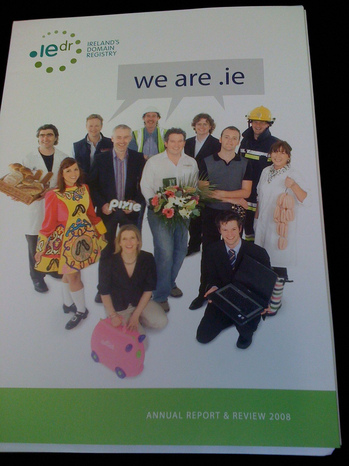So what does a ccTLD operator do when they’re worried about cashflow?
They go off and spend thousands on a glossy annual report obviously!
The IEDR’s annual report and review for 2008 is the glossiest one they’ve produced to date. As usual it contains plenty of fluff while ignoring anything of substance.
In the Chairman’s introductory statement they reveal that:
“The board has agreed terms of reference for a Policy Advisory Committee (PAC) to advise on .ie namespace policy matters, the membership to be representative of relevant stakeholder organisations”
Well that’s charming.
The document that was being discussed between the IEDR and its resellers was firmly slanted in the IEDR’s favour and had not been accepted by the reseller community.
So now it looks like the IEDR have done what they always do and unilaterally implemented a change without accepting feedback from the companies that pay their bills (registrars / resellers) or those that give them a raison d’etre (registrants).
Scanlan goes on to infer that the IEDR have been appointed as the registry operator for the .ie namespace permanently. This is not the case, unless whoever wrote the Comreg documents is a very bad communicator, which I somehow doubt.
Making repeated reference to the Comreg report is annoying, as Comreg did not actually publish the report of the external consultants. All that was published was the result of the public consultation – and even that was months behind schedule and did not reveal anything really meaty.
So what about the rest of this year’s report?
Well it has got lots of plenty glossy photos of IE registrants (Why aren’t they using this in publications that the public see???) there isn’t a huge amount of substance.
The report states the following about the aftermarket which underlines the level of their ignorance
“.. Furthermore, there is no secondary market for .ie domains, which reduces the incentive for ‘domainers’ to engage in cybersquatting and domain warehousing”
So all “domainers” are “cybersquatters”?
Why does the IEDR have such a ridiculous fear of the secondary market?
Other registry operators such as AFNIC, which also restricts registrations to some degree, do not see aftermarket activity in such negative terms.
It could also be argued that the registry’s restriction on trade in domains is unlawful
One could also argue that the IEDR’s current “managed registry” model, whatever that is exactly, contravenes Article 10 of the European Convention on Human Rights.
In case you’re not familiar with that specific article here it is:
“ARTICLE 10
1. Everyone has the right to freedom of expression. this right shall include freedom to hold opinions and to receive and impart information and ideas without interference by public authority and regardless of frontiers. This article shall not prevent States from requiring the licensing of broadcasting, television or cinema enterprises.
2. The exercise of these freedoms, since it carries with it duties and responsibilities, may be subject to such formalities, conditions, restrictions or penalties as are prescribed by law and are necessary in a democratic society, in the interests of national security, territorial integrity or public safety, for the prevention of disorder or crime, for the protection of health or morals, for the protection of the reputation or the rights of others, for preventing the disclosure of information received in confidence, or for maintaining the authority and impartiality of the judiciary. “
Has anyone ever challenged the consitutionality of the IEDR’s stance?
As a body that draws its powers from Comreg’s regulation and Irish legislation it cannot continually use the excuse of being a private company.
But I still fail to see how the IEDR can justify the expense of a glossy report like this yet be incapable of communicating an important policy change to its stakeholders (sole traders may now register their surname). Spending money on improving their communications with stakeholders would appear to be a better way of investing their funds.
Do Comreg care enough to actually act?
Or will they sit idly by while the IEDR cherrypick which voices to hear and implement policy changes with little or no real input?
UPDATE: I’ve attached the full report (4.2 MB PDF):
IEDR AN Report 08-web.pdf

Comreg are probably more worried about the Snip report and being merged with the Broadcasting Commission.